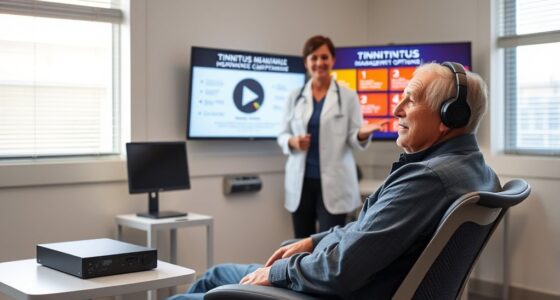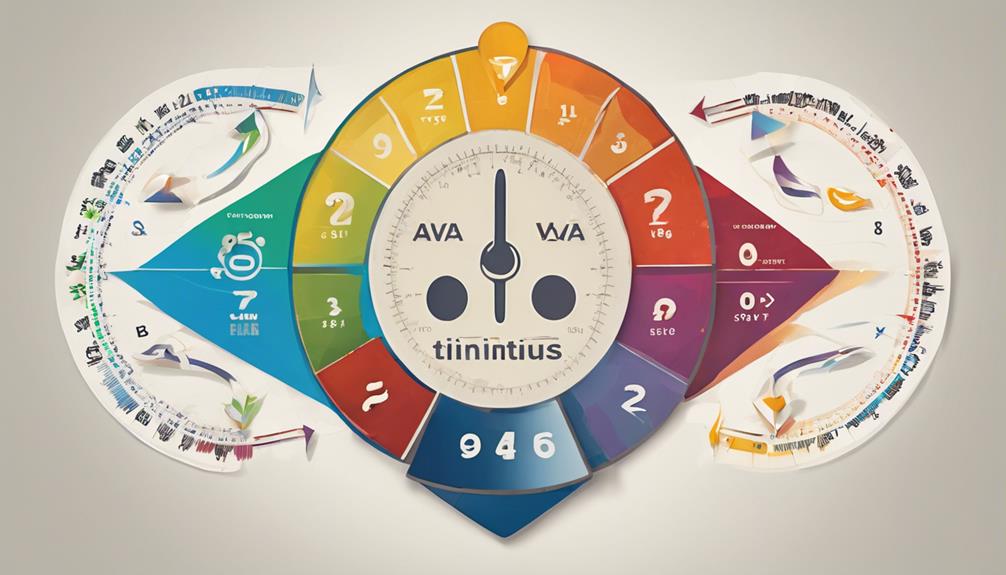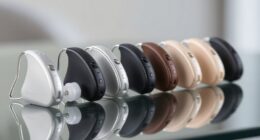As we navigate the intricate maze of regulations surrounding disability claims for hearing loss and tinnitus, it seems like we are unraveling a difficult puzzle with vital pieces still needing to be put together.
Understanding the nuances of eligibility requirements and the significance of compelling evidence can be the linchpin in securing the support you deserve.
Stay tuned to discover the strategies and insights that could make all the difference in your journey towards obtaining disability benefits for hearing loss and tinnitus.
Key Takeaways
- Meet SSA criteria for hearing loss disability.
- Provide thorough medical documentation and evidence.
- Seek legal assistance for a successful claim.
- Emphasize impact on work and daily functioning.
Understanding Disability for Hearing Loss
When applying for disability benefits due to hearing loss, it's essential to understand the specific criteria set by the SSA to determine eligibility.
Hearing loss is recognized as a disability by the Social Security Administration (SSA), and individuals may qualify for disability benefits if their condition prevents them from working. Different types of hearing loss, such as conductive, sensorineural, and mixed types, are acknowledged, with the severity determined through audiometric testing.
Full deafness in both ears automatically qualifies for benefits, and cochlear implants may also make individuals eligible. The Disability benefits application requires specific medical documentation, including audiograms and other relevant tests, to support the claim.
In some cases, tinnitus, a ringing in the ears, can also be considered in the disability evaluation process. Understanding the nuances of hearing loss disabilities and the criteria set by the SSA is crucial when seeking financial assistance for this condition.
Qualifying Criteria for Hearing Loss Disability

Exploring the specific criteria for qualifying for disability benefits due to hearing loss involves understanding the severity of the condition through audiometric testing and the types of hearing loss recognized by the Social Security Administration (SSA). The SSA acknowledges different types of hearing loss, including conductive, sensorineural, and mixed types. Qualification for disability benefits relies on the inability to work due to the hearing impairment, with full deafness in both ears automatically meeting the criteria. Cochlear implants may also be considered for disability benefits, depending on the impact of the hearing loss on the individual's ability to work. Audiometric testing plays a crucial role in determining the severity of the hearing loss and its effect on daily functioning. Below is a table summarizing the key points related to the qualifying criteria for hearing loss disability:
| Criteria | Details |
|---|---|
| Types of Hearing Loss | Conductive, Sensorineural, Mixed Types |
| Qualification Basis | Inability to Work |
| Full Deafness | Automatic Qualification for Disability Benefits |
| Cochlear Implants | May Qualify Depending on Impact on Ability to Work |
Applying for Disability Benefits With Tinnitus
Upon meeting the qualifications for hearing loss disability, individuals experiencing severe tinnitus can also apply for disability benefits based on the impact of tinnitus on their ability to work. To support a long-term disability claim for tinnitus, obtaining a doctor's diagnosis is crucial.
Symptoms such as cognitive impairments and concentration difficulties that arise from tinnitus can bolster the case for disability benefits. It's essential to adhere to recommended tinnitus treatments as part of the disability benefits approval process.
Seeking legal assistance can also be beneficial in highlighting the disabling symptoms of tinnitus to increase the chances of a successful disability claim. By addressing how tinnitus affects work ability and providing thorough documentation of its impact, individuals can strengthen their case for disability benefits.
Working closely with healthcare providers and legal professionals can help navigate the complexities of the disability benefits application process, ensuring that the disabling effects of tinnitus are effectively communicated for a successful claim.
Navigating the Disability Application Process

Successfully navigating the disability application process for hearing loss and tinnitus requires thorough documentation and adherence to specific criteria outlined by the Social Security Administration (SSA).
To qualify for disability benefits, applicants must demonstrate how their hearing loss prevents them from working. Medical records, test results such as a word recognition test, and details of treatment are crucial for supporting the application.
The SSA's Blue Book listing outlines the requirements for hearing loss and tinnitus to be considered disabling conditions. It's essential to showcase how these conditions impact one's residual functional capacity.
When applying for Social Security disability benefits, seeking assistance from a disability attorney or financial advisor can provide valuable support in understanding the process and ensuring all necessary information is included in the application.
Persistence is key, as denials are common, and appealing decisions may be necessary to secure the benefits deserved.
Maximizing Support for Hearing Loss and Tinnitus
To maximize support for hearing loss and tinnitus in disability claims, emphasizing the impact of these conditions on daily functioning and work performance is crucial. When seeking Social Security disability benefits for hearing loss and tinnitus, it's essential to provide detailed evidence to support your disability claim. This evidence may include medical records documenting the severity of your condition, test results indicating the extent of your hearing loss or tinnitus, and proof of compliance with treatment plans.
The ability to work is a key factor in determining eligibility for disability benefits related to hearing loss and tinnitus. Clearly articulating how these conditions affect your job performance and daily activities can strengthen your case. Seeking assistance from experienced disability attorneys can also be beneficial in navigating the complex disability application process. These professionals can guide you through the specific criteria and evaluation processes involved in hearing loss and tinnitus disability claims, ultimately maximizing your chances of receiving the support you need.
Frequently Asked Questions
What Can Be Done for Hearing Loss and Tinnitus?
For hearing loss and tinnitus, various interventions can help. These include cochlear implants for severe hearing loss and legal support to enhance disability approval for tinnitus. Documenting cognitive impacts due to tinnitus is crucial.
Compliance with tinnitus treatments is necessary for ongoing benefits. Seeking legal assistance can emphasize how tinnitus affects work performance. These actions can improve our chances of managing hearing loss and tinnitus effectively.
What Is the Easiest Condition to Get Disability?
Obtaining disability benefits can be challenging, but we can help simplify the process. Factors like severity of symptoms and impact on job performance are crucial.
Providing thorough medical records and evidence of treatment compliance is vital. Did you know that only 36% of disability claims are approved at the initial application stage?
Seeking legal assistance can significantly increase our chances of approval. Let's focus on building a strong case to secure the benefits we deserve.
What Should You Not Say When Applying for Disability?
When applying for disability, it's crucial not to misrepresent our condition by exaggerating or downplaying symptoms. We should avoid providing inconsistent information or leaving out important details.
Ignoring or minimizing the impact of our condition on daily activities and job performance is a mistake. Contradictory statements and disregarding medical evidence can also harm our application.
Being truthful and thorough in our communication is essential for a successful disability claim.
Can I Work With Tinnitus?
Absolutely, we can work with tinnitus, but its impact varies. Concentration difficulties and communication challenges are common. Severe symptoms like ringing affect productivity. Cognitive issues, memory problems, and impaired concentration may be disabling.
Symptoms like poor sleep, fatigue, depression, anxiety hinder performance. Documenting impairments and limitations is vital for supporting a disability claim and ensuring proper accommodations in the workplace.
Conclusion
In conclusion, when it comes to applying for disability benefits for hearing loss and tinnitus, it's important to dot your i's and cross your t's.
Ensuring all necessary documentation is in order and seeking support throughout the process can make a significant difference in your chances of approval.
Remember, the early bird catches the worm – so don't delay in taking action to secure the assistance you need for your hearing health needs.










